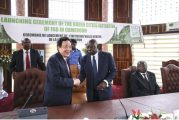Categories
Recent Posts
- Southern Cameroons refugees in Nigeria receive farm seedlings
- Douala: Investment Forum wraps up with honors for investment champions
- Understanding the Biya Francophone regime’s support for the Israeli genocide in Gaza
- US: Prosecution lays out ‘criminal conspiracy’ as Trump’s hush money trial opens
- FAO formally launches Green Cities Initiative in Cameroon
Archives
- April 2024
- March 2024
- February 2024
- January 2024
- December 2023
- November 2023
- October 2023
- September 2023
- August 2023
- July 2023
- June 2023
- May 2023
- April 2023
- March 2023
- February 2023
- January 2023
- December 2022
- November 2022
- October 2022
- September 2022
- August 2022
- July 2022
- June 2022
- May 2022
- April 2022
- March 2022
- February 2022
- January 2022
- December 2021
- November 2021
- October 2021
- September 2021
- August 2021
- July 2021
- June 2021
- May 2021
- April 2021
- March 2021
- February 2021
- January 2021
- December 2020
- November 2020
- October 2020
- September 2020
- August 2020
- July 2020
- June 2020
- May 2020
- April 2020
- March 2020
- February 2020
- January 2020
- December 2019
- November 2019
- October 2019
- September 2019
- August 2019
- July 2019
- June 2019
- May 2019
- April 2019
- March 2019
- February 2019
- January 2019
- December 2018
- November 2018
- October 2018
- September 2018
- August 2018
- July 2018
- June 2018
- May 2018
- April 2018
- March 2018
- February 2018
- January 2018
- December 2017
- November 2017
- October 2017
- September 2017
- August 2017
- July 2017
- June 2017
- May 2017
- April 2017
- March 2017
- February 2017
- January 2017
- December 2016
- November 2016
- October 2016
- September 2016
- August 2016
- July 2016
- June 2016
Featured
 Understanding the Biya Francophone regime’s support for the Israeli genocide in Gaza
Understanding the Biya Francophone regime’s support for the Israeli genocide in Gaza  Poverty under Biya: Cameroonians embrace Chinese language for brighter futures
Poverty under Biya: Cameroonians embrace Chinese language for brighter futures  Cameroon is broken: Who can fix it?
Cameroon is broken: Who can fix it?  Ethiopia: U.S Senator Cardin Statement on the Killing of Bate Urgessa
Ethiopia: U.S Senator Cardin Statement on the Killing of Bate Urgessa  Battle for the Unity Palace: ANNOUNCEMENT!
Battle for the Unity Palace: ANNOUNCEMENT!
Most Commented Posts
 4 Anglophone detainees killed in Yaounde
4 Anglophone detainees killed in Yaounde
19 comments Chantal Biya says she will return to Cameroon if General Ivo Yenwo, Martin Belinga Eboutou and Ferdinand Ngoh Ngoh are sacked
Chantal Biya says she will return to Cameroon if General Ivo Yenwo, Martin Belinga Eboutou and Ferdinand Ngoh Ngoh are sacked
13 comments Anglophone Nationalism: Barrister Eyambe says “hidden plans are at work”
Anglophone Nationalism: Barrister Eyambe says “hidden plans are at work”
12 comments The Anglophone Problem – When Facts don’t Lie
The Anglophone Problem – When Facts don’t Lie
12 comments Largest wave of arrest by BIR in Bamenda
Largest wave of arrest by BIR in Bamenda
10 comments
Latest Tweets
Featured
-

Southern Cameroons refugees in Nigeria receive farm seedlings
-

Douala: Investment Forum wraps up with honors for investment champions
-

Understanding the Biya Francophone regime’s support for the Israeli genocide in Gaza
-

US: Prosecution lays out ‘criminal conspiracy’ as Trump’s hush money trial opens
-

FAO formally launches Green Cities Initiative in Cameroon
-

Football: Barcelona wants Clasico replay if Yamal ‘ghost goal’ call wrong
-

Poverty under Biya: Cameroonians embrace Chinese language for brighter futures
© Cameroon Concord News 2024
2, June 2016
Cameroonians brace for impact, terrified by the uncertainties of a micro-managed succession 0
“Brace for impact!” Only few survivors of plane crashes live to tell the story of the sheer horror of those ominous words … heard through the Aircraft’s public address system, in the harrowing seconds, before the plane goes down.Yet, this is the same feeling most Cameroonians are now having, because of the sheer uncertainty of 82-year old Biya, whose succession has become another French-micro-managed scandal, like Ivory Coast, and Burkina Faso. Cameroonians generals and some well-placed members of Biya’s presidential guard have shipped their families abroad and are maintaining open-ended visas, to enable them leave on short notice.
Biya who has ruled the country from a Swiss hotel, like the absentee-landlord of a criminal enterprise, is now faced with in- fighting between his most trusted accomplices. Martin Belinga Eboutou, Rene Sadi, Alain Edgar Mebe- Ngo’o and other members of his close concentric circle of flunkies, are divided on how the succession process should occur. Of course, each group is supported by its own lobby at the Elysee in Paris.
Those who argue the Biya has signed a concealed order to be release in the event of his sudden death, claim that his chose of Rene Sadi as his successor is informed by his Baboute ethnicity- a small Muslim ethic group in the Mbam and Kim division, that will allow Biya to thwart the power ambitions of the Fulani royalty of the North, who claim the leadership in Cameroon as their birth right … on the threat of civil war.
The recent French rescue of Burkina Faso’s Blaise Compoare, and his exile in Yamoussoukro – Ivory Coast, is a recent indicator of the long arm of the French in its nominally independent former colonies, which are still treated as the oversees extension of the French empire. The ultra-militarization of the country has left Cameroonians terrified and cowered by the vicissitudes of daily survival, and the need to leach on the boss who may be linked to the winning lobby.
Cameroonians abroad are busy burnishing their images with Washington and Paris, and presenting lofty résumés’ as to what leadership skills and erudition they possess. Due to the centralization of power in Yaoundé, the common folk in the villages are left out in this succession struggle.
Anglophones are again being naïve in thinking that the French will be out of their mind to accept one of them, as a leader in one of their strategic neo-colonies, which is the gateway to their Central African Empire. With leaders like Fru Ndi, who has accepted bribes to play by the rules of French domination, the present crop of appointees shine only through their cowering and cringing attitude to their Francophone boses like Fame Ndongo who claims that Biya is a “tin-god” with Philemon Yang, Achidi Achu, Nji Atanga, the late Agbor Tabi, Ngolle Ngolle, as his “creatures”
Anglophones, the orphaned people handed over to the British after the second world war, have been described by Pierre Mesmer (Former French Governor in Cameroon and French Prime Minister in the 60s) as a little gift of the Queen of England to General De Gaulle. Crafty aspirants to Anglophone leadership have been hitching their hopes on a lucky Francophone master who could be picked by France to rule Cameroon- their private hunting ground.
The real problem of Cameroon, that the French have refused to deal with, is again rearing its ugly head. Will Cameroon finally accept the democratic and demographic solution of one-man, one vote?. That is the question that is plaguing power brokers like Joseph Owona and Amadou Ali who see the youth bulge that constitutes the majority of the country now, as a Bamileke problem.
According to some conservative Cameroonian pundits, with approximately 250 distinct ethnic entities, the Bamilekes who live in feudal fiefdoms do not seem to stand a chance, by dint of their control of the economic, financial and demographics of Cameroon. That is why the French “pacifier” of the Bassa and Bamileke nationalist movement, referred to the “Bamilekes” as the prickly pebble in the shoe of French colonization in Cameroon.